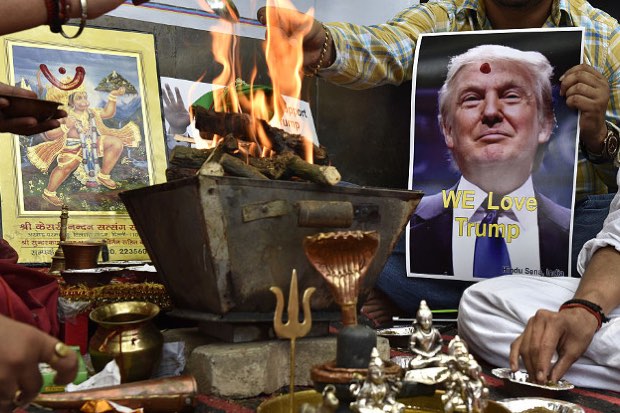‘I am a big fan of Hindu… Big, big fan’ yelled Donald Trump during a brief appearance at a bizarre charity event in October, blending Bollywood and Americana patriotism. The ‘Humanity United Against Terror’ concert, organised by the Republican Hindu Coalition, was raising money to combat ‘radical Islamic terrorism’ that specifically targeted Hindus from Kashmir and Bangladesh. A new campaign video celebrating Diwali, in which Trump speaks several words in Hindi, echoes this same sentiment.
At first glance this might seem another attempt by the Presidential candidate to rustle up support from minority groups; akin to comments such as, ‘I love Hispanics!’ while posing with a Cinco de Mayo taco bowl, or asking ‘What do you have to lose?’ when addressing black voters. But the colourful language belies an unlikely alliance, which has at its core a profound distrust of Islam. And Trump’s anti-immigrant, anti-Islam rhetoric is having an unlikely effect on sectarian tensions on the other side of the world.
Most American Indians do not support Trump, and there is a proportionally high Democratic membership amongst them. A poll of Asian-Americans’ political leanings conducted last month found that just 7 per cent said they would vote for the republican candidate. But while Trump has largely failed to mobilise Hindu supporters in the US, he has found strong support from from an increasingly zealous and loud-mouthed group of Hindu nationalists based in India.
Since the election of Narendra Modi’s Bharatiya Janata party (BJP) in India two years ago, Hindu nationalist narratives have grown increasingly emboldened in both the domestic and international arenas. One of the core planks of ‘Hindutva’ ideology is the idea of Hindu primacy and supremacy, resulting in the sidelining of India’s religious minorities, particularly Muslims and Christians, as well as those of lower caste.
In recent months, there has been increasing focus on the activities of Hindu cow protection vigilantes. The cow is sacred for Hindus, and a number of deadly lynchings have been carried out against accused smugglers, most of them Muslims. Modi recently broke his deafening silence on the issue by criticising ‘anti-social elements’ within the gangs, while BJP-led states continue to toughen jail sentences for cow trafficking and slaughter.
Two aspects of Trump’s rhetoric have particularly deep resonance for such hardline Hindu groups; his tough stance on Muslim immigration, and his strong rhetoric against ‘radical Islamic terror,‘ and in particular, Isis. In Delhi, religious ceremonies celebrating the republican nominee and his politics have included the application of the tilak, the red dot symbolic of the spiritual third eye in Hinduism, to Trump’s forehead in photographs.
Prime Minister Narendra Modi is revered in a similar way. Jeremy Peters of the New York Times says ‘it is certainly not coincidental that many of Mr. Trump’s biggest Hindu supporters are also some of Mr. Modi’s most ardent backers.’ As Trump comes under fire for his controversial proposal of ‘extreme vetting’ of Muslim immigrants ‘until we work out what is going on’ with Islamist extremism, the BJP was accused of stoking anti-Muslim sentiments, specifically concerns about immigration, in recent elections in Assam state, which borders Muslim-majority Bangladesh.
Economically, both leaders have campaigned on a populist ticket of fixing a broken system, and bringing their counties to their full potential. The Trump alliance with Hindu nationalism is also framed through an intensely geopolitical lens. One supporter at a rally in Delhi was recorded as saying ‘The Obama administration emboldened Pakistan to trespass into Indian territory. The threat of Isis is also looming over India. We need support from an ally like the USA.’ However, while the Hindu nationalist vilification of ‘radical Islam’ might seem a confluence of interest with Donald Trump, the movement’s attacks on churches and targeting of Christian evangelists might play less well with the nominee’s religious support base.
Both leaders have also been accused of perpetuating a worldview that problematises Islam; conflating a diverse global religion of 1.6 billion adherents exclusively with threat, and failing to see it as a crucial ally in the battle against extremist ideas. Meanwhile the perception of the ‘main victims‘ of terror being Hindus and Christians neglects the fact that the vast majority of those who suffer from extremism worldwide are Muslim.
Whether he wins or not, major concerns have been raised about the effect Trump’s rhetoric is having on community relations. Muslims across the US have blamed Donald Trump’s incendiary rhetoric, including his calls to ban Muslims from the United States, for a rise in prejudice on religious grounds at a community level. But Trump’s campaigning also taps into a broader populism that is on the rise globally, which offers simple solutions, and easy villains, for the complex challenges faced in today’s globalised world.
Milo Comerford is an Analyst at the Centre on Religion and Geopolitics. He leads research on the South and Central Asia region, as well as research development globally, where his focus centres on jihadi ideology and propaganda.







Comments